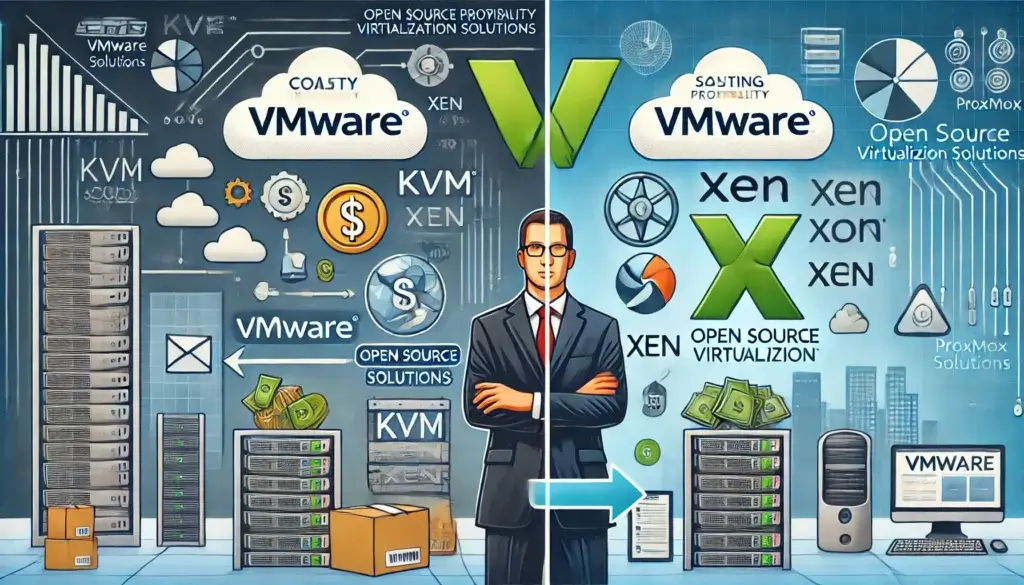Considering Alternatives to VMware? We’ve Got You Covered.
The cost of maintaining VMware licenses is on the rise, and many businesses are now feeling the impact. Increased costs are making IT leaders rethink their long-term infrastructure strategy. At Tiger Computing, we understand the pressure to cut costs without sacrificing performance. Open Source virtualization solutions present a compelling, cost-effective alternative to VMware—and we’re here to help you make the transition seamlessly.
Why Switch from VMware?
For years, VMware has been the go-to solution for virtualization. However, its licensing costs, coupled with rising Total Cost of Ownership (TCO), are making it less attractive for businesses that want to stay competitive. According to recent research, the ongoing expenses of VMware are forcing businesses to consider alternatives that offer similar functionality at a fraction of the cost.
The Open Source Advantage
Switching to an Open Source virtualization platform doesn’t mean compromising on performance or reliability. Solutions like KVM, Xen, Proxmox, Oracle VirtualBox, and others provide powerful, scalable options without the high price tag of VMware. These platforms are not only more cost-effective but also offer greater flexibility, ensuring you have control over your infrastructure.
Let’s take a closer look at what each of these Open Source solutions offers:
- KVM (Kernel-based Virtual Machine) is directly integrated into the Linux kernel, offering performance that rivals enterprise solutions like VMware. It’s highly scalable and ideal for businesses that need to handle large-scale workloads. KVM is trusted in large-scale cloud environments like Google Cloud, proving its reliability and performance in demanding scenarios.
- Xen provides a secure and fast virtualization environment with minimal overhead. As a Type-1 hypervisor, Xen operates directly on hardware, which makes it highly efficient. It’s used by many of the world’s largest cloud providers, and it offers excellent isolation between virtual machines, making it a solid choice for businesses with high security demands.
- Proxmox stands out with its easy-to-use interface and strong community support. It integrates KVM and Linux Containers (LXC), giving businesses the ability to manage both virtual machines and containers on a single platform. Proxmox is an excellent choice for businesses seeking simplicity in managing their infrastructure, along with the flexibility to scale as needed.
- Oracle VirtualBox is a more lightweight solution that works across multiple platforms. It’s particularly suited to businesses with smaller, more tailored environments that may not require large-scale infrastructure but still need reliable virtualization without excessive costs.
Long-Term Benefits of Open Source Solutions
One of the most significant advantages of Open Source virtualization is its future-proofing capabilities. These platforms are continuously developed and supported by large communities, meaning they evolve alongside emerging technologies and trends. You’re not locked into a single vendor’s roadmap—Open Source gives you the freedom to adapt your infrastructure to meet your evolving business needs.
Moreover, scalability is a key strength of Open Source solutions. Whether you’re looking to grow your infrastructure or streamline operations, platforms like KVM and Proxmox allow you to scale up or down with minimal effort and cost. This flexibility can be crucial for businesses looking to maintain agility in a fast-changing market.
Additionally, by embracing Open Source, your business can benefit from cost transparency. You’ll have clear visibility into where your investments are going, without the hidden fees or fluctuating costs that often come with proprietary solutions.
Addressing Common Concerns
We understand that some businesses may have concerns when it comes to Open Source solutions—particularly around security, support, and reliability. At Tiger Computing, we’ve been providing Linux-based infrastructure solutions for over 22 years, and we are fully equipped to address these concerns.
Security: Open Source virtualization platforms are widely used in enterprise environments, from financial institutions to tech giants. They benefit from continuous scrutiny by the global Open Source community, which means security vulnerabilities are identified and patched quickly. Moreover, our team ensures that your system is configured with best-in-class security practices.
Support: One of the most common misconceptions is that Open Source solutions lack professional support. At Tiger Computing, we offer comprehensive support services, ensuring that your Open Source infrastructure is managed, monitored, and maintained just as reliably as any proprietary system.
Reliability: Open Source solutions like KVM and Xen have proven track records in large-scale, mission-critical environments. They are stable, reliable, and able to handle even the most demanding workloads.
Why Tiger Computing?
At Tiger Computing, we specialize in Linux. With over 22 years of experience, we are uniquely positioned to help high-tech businesses manage the transition from VMware to Open Source solutions. Our team understands the nuances of virtualization, and we’ll work closely with you to ensure a smooth transition that minimizes downtime and maximizes cost savings.
We are proud to be ISO27001 certified, ensuring that your infrastructure will be secure, compliant, and reliable throughout the process.
Take Control of Your IT Budget
Reducing your reliance on expensive, proprietary solutions like VMware is a strategic move. Open Source platforms provide the flexibility, security, and performance that businesses need—without the hefty price tag. Let us guide you through the process, ensuring that your infrastructure is both future-proof and cost-efficient.
Interested in Learning More?
Contact Shaun Poole at Tiger Computing for a consultation today.
📧 sales@tiger-computing.co.uk
📞 01600 404 270

